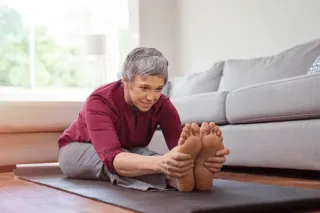Arthritis Treatments
Arthritis treatment primarily aims to alleviate pain, reduce joint inflammation, and improve mobility, ensuring a better quality of life for those affected. Depending on the type and severity of arthritis, treatment options can vary from over-the-counter pain relievers and anti-inflammatory drugs to physical therapy, dietary changes, and even surgical interventions in advanced cases. Recent advancements also explore the potential of biologics and disease-modifying antirheumatic drugs (DMARDs) for certain forms of arthritis. Complementary therapies, like acupuncture and massage, can also offer additional relief for some patients. Regular consultation with a rheumatologist or physician is essential to tailor an effective treatment plan.

How Age at First Birth May Influence RA Risk
Rheumatoid arthritis (RA) is a chronic autoimmune condition that affects more women than men—often striking in the prime of life. ...more
Arthritis ,Treatment About Arthritis &Rheumatoid Arthritis
March 10, 2025•3 min read

The Link Between Acid Reflux and Rheumatoid Arthritis Treatment
Rheumatoid arthritis (RA) is a complex autoimmune disease that requires consistent, long-term management. For many patients, methotrexate remains a cornerstone of treatment due to its ability to contr... ...more
Arthritis ,Treatment About Arthritis &Rheumatoid Arthritis
March 08, 2025•3 min read

Early Menopause and Rheumatoid Arthritis: Understanding the Connection
For many women, menopause marks a significant life transition, bringing various hormonal and physical changes. However, emerging research suggests that menopause, particularly early menopause (before ... ...more
Arthritis ,About Arthritis &Rheumatoid Arthritis
January 29, 2025•2 min read

Why 70% of People with Rheumatic Diseases Aren’t Meeting Exercise Goals—And Why It Matters
Living with inflammatory rheumatic diseases (IRDs), like rheumatoid arthritis, often means battling fatigue, joint pain, and stiffness on a daily basis. But did you know that regular physical activity... ...more
Arthritis ,diet Treatment Osteoarthritis Rheumatoid Arthritis &Pain Management
November 06, 2024•4 min read

GERD and Rheumatoid Arthritis: A Surprising Connection That Could Protect Your Joints
Did you know that a common digestive issue, Gastroesophageal Reflux Disease (GERD), could significantly increase your risk of developing Rheumatoid Arthritis (RA) by over 40%? It’s an eye-opening reve... ...more
Arthritis ,About Arthritis &Rheumatoid Arthritis
September 20, 2024•4 min read

Can Telehealth and Training Enhance Treat-to-Target Strategies for Rheumatoid Arthritis?
Managing rheumatoid arthritis (RA) often requires a careful balance of medication, monitoring, and treatment adjustments. A proven strategy, known as "treat-to-target," focuses on setting specific goa... ...more
Arthritis ,Treatment About Arthritis &Rheumatoid Arthritis
September 05, 2024•3 min read
Understanding Arthritis Through the Numbers
60 million
Close to 60 million adults have been professionally diagnosed with arthritis.
1in 4
One out of every four adults is affected by some form of arthritis.
300,000
A remarkable 300,000 young ones are living with juvenile arthritis.
100+
There are more than 100 conditions related to arthritis
Promoting Interventions That Reduce Arthritis Pain
American Arthritis Foundation recognizes several proven approaches to reduce arthritis symptoms:
Be active. Physical activity—such as walking, bicycling, and swimming—decreases arthritis pain and improves function, mood, and quality of life. Adults with arthritis should move more and sit less throughout the day. Getting at least 150 minutes of moderate-intensity physical activity each week is recommended.
Protect your joints. People can help prevent osteoarthritis by avoiding activities that are more likely to cause joint injuries.
Talk with a doctor. Recommendations from health care providers can motivate people to be physically active and join a self-management education program. Should your arthritis be interfering with your activities of daily living you may be a candidate to receive many new treatments, and learn how to reverse the arthritis condition.
Have a question?
We're Here to Help
By providing my phone number, I agree to receive text messages from the business.


